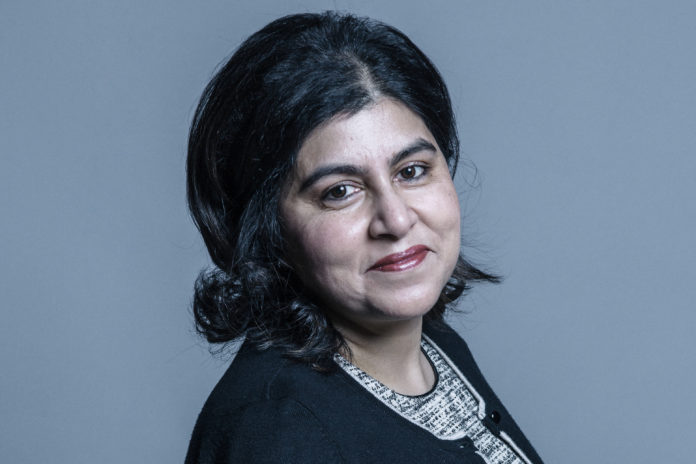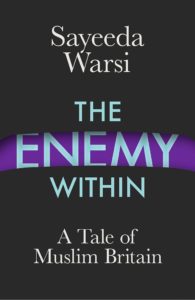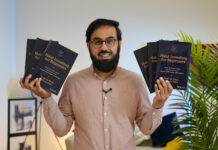Roshan Muhammed Salih reviews Baroness Sayeeda Warsi’s new book, The Enemy Within, which is a scathing attack on UK Government policy towards Muslims.
As a government insider between 2010-14, Sayeeda Warsi served in the Communities Department and the Foreign Office. She therefore had an insider’s view on how David Cameron’s government implemented domestic and foreign policy with regard to Muslims. And her conclusion is: not very well.
In her book, Warsi takes aim at the government’s Prevent counter-terrorism policy in particular, which she says is being implemented on Muslims rather than with Muslims. She says that the government focuses excessively on “Islamist ideology” as a cause of radicalisation and ignores other factors such as foreign policy, Islamophobia and disenfranchisement. And she says that the government has refused to engage with the Muslim community as a whole, instead preferring to talk to non-representative groups that tell them what they want to hear.
Much of what Warsi says chimes with what Muslim activists have been saying for years, but now they have the testimony of someone who actually witnessed government in operation to back up their arguments.
Trying to fit in
The Enemy Within is a political book rather than a personal one, but Sayeeda Warsi does give an account of how her upbringing, as a working-class British Pakistani Muslim, shaped her political views. This is perhaps the weakest section of the book and could even be described as a bit dull because nothing particularly interesting happened in her youth.
That said, it’s clear from an early age growing up as an ethnic minority in Bradford, Warsi was desperate to belong; to be accepted as British. So she describes the joy she found at signing hymns at school and how she loved to celebrate Christmas.
Subscribe to our newsletter and stay updated on the latest news and updates from around the Muslim world!
“As a child I needed to belong, to fit in, to be part of a world and experiences of my friends and neighbours,” she writes. “I wanted to belong in all the different parts that made up the sum of my world: the Pakistani bit, the Saville Town bit, the English bit, the Asian bit, the western bit, the female bit and the many versions of Islam bit.”
Warsi describes her religious upbringing as non-sectarian and Sufi-oriented, and frequently takes aim at what she considers to be the more conservative or literalist interpretations of Islam which consider girls as a “burden.”
And indeed it is her identity as a female which seems to have defined her youth the most, giving her a determination to break down barriers in her own community and prove she was as good as, or even better, than any boy.
David Cameron
As she got older Warsi and her family enjoyed huge success. Her father’s business turned him into a millionaire and she became a successful lawyer.
At some point she joined the Conservative Party although it’s not quite clear why, and much of the rest of the book will leave you wondering if she’s a Tory at all. A particularly bitter moment seems to have been her one, and only tilt at becoming an MP in 2005 when she was defeated in Dewsbury. Apparently she still blames the “male Dewsbury community mafia” for this.
But despite this defeat her political career took off thanks to her association with David Cameron. And indeed her thoughts on Cameron and the chapters on her time in government are easily the most interesting in the book. Warsi basically owes her political career to the former prime minister because after she failed to get elected to parliament Cameron made her a peer in the House of Lords, and subsequently promoted her to cabinet. Yet, despite her debt to Cameron she doesn’t hold back in her criticism of him.
Warsi portrays the Cameron of 2005-7 as an open-minded individual who really wanted to understand the “Muslim experience” in Great Britain. But she says that Cameron gradually came under the sway of the right-wing neocon Michael Gove (the real baddy in the book) and soon he was spouting off about “muscular liberalism” and “Christian values” while denouncing multiculturalism.
And indeed all the hallmarks of the neocon Gove became apparent in government policy, in particular the over-egging of the terror threat and the focus on shifting all the blame onto Muslims.
“We are twelve years on from 7/7,” Warsi writes, “yet I believe that government’s understanding today of what makes a jihadi is less sophisticated, less evidence-based, and sadly less honest. Today’s government is worryingly less engaged with Britain’s Muslim communities and less trusted by them. Policy making has over time shifted from hard evidence of what makes a jihadi and chosen instead to shine a spotlight on the abstract notion of ideology.”
Muslim groups
During her time in government Warsi interacted, didn’t interact, or was prevented from interacting, with a plethora of Muslim groups and many of them are criticised for fighting over the pot of gold that was government money, thus creating a sort of “Muslim industry.”
She has a negative view of Hizb ut-Tahrir for telling Muslims not to engage in politics. She describes HT activists as mostly “men with huge egos, misogynists, usually confrontational and never wrong.” FOSIS are “neither politically savvy nor actually committed enough to affect real change.” And CAGE’s work has been undermined by “their unwillingness to find words of condemnation for those engaged in terrorism.”
The short-lived Sufi Muslim Council, she writes, was launched with “great fanfare” but “nobody in the British Muslim community had heard of it,” and by 2010 the group was effectively defunct with a small handful of volunteers and administrators, and indeed government, left holding a financial failure.”
She says the Quilliam Foundation is seen as one of Tony Blair’s last gifts to British Muslims and has been one of the most “despised parts of the Muslim industry… a depository for British Muslim anger, distrust and ridicule.” Within British Muslim communities it has arguably become the “mother of failed experiments, but in a wider context it has become a huge media success, dominating the airwaves on all things Muslim and making red meat statements to the red tops.”
Tell MAMA, which Warsi herself helped to fund, has a “well-intentioned but highly emotional” CEO in Fiyaz Mughal and lacks credibility among the community. It “invests too much time talking down other Muslim activists and groups.”
On the other hand, MEND is praised because it has “the potential to achieve real change,” because it is grassroots-funded and run, and is a “doer not a sayer.”
But despite her interesting reflections on British Muslim groups, Warsi lays into government for not interacting with enough of them and for setting up impossible yardsticks by which to judge them. For example, she laments the fact that government ministers wouldn’t appear at one Global Peace and Unity (GPU) event organised by Islam Channel because some of the speakers may have said stuff that government would object to. She even claims that Islam Channel effectively asked the government to vet their list of GPU speakers.
Controversy
From a Muslim perspective there are some bits in the book that will prove to be controversial, especially Warsi’s views on homosexuality and the burqa.
Warsi says she regrets the “homophobic” campaign that she ran to get elected to parliament in 2005 and generally comes across as a big champion of LGBT rights. And obviously this won’t sit well with the vast majority of Muslims who firmly believe that homosexuality is a major sin and should not be promoted. She offers no theological justification for her position but it seems as though she has made up her mind on this one and that is that.
“I too have been homophobic,” she says. “It’s something I am deeply ashamed of. My campaign literature from my 2005 campaign is toe-curlingly embarrassing and deeply offensive.”
Then, quite shockingly, she also wades into the burqa, which left me wondering why she had taken aim at a small minority of Muslim women who are among the weakest and most vulnerable members of our society.
She writes: “As a feminist I will always defend a woman’s right to wear what she wants, as a Brit I will champion individual liberty, but as Muslim I increasingly find myself questioning whether the burqa is the best manifestation of British Islam. It’s an expression of identity I sincerely want to see the British Muslim community lead to bringing to an end.”
What hope have the rest of us got?
The Enemy Within is not a great work of literature and seems quite poorly structured at times with several appendixes stapled onto the end. What’s more, sections of the book are far too academic and long-winded for the general reader and Warsi does seem to go off on intellectual tangents too often. She also doesn’t seem too comfortable talking about her personal life, or maybe it just isn’t very interesting.
More fundamentally, many will question why Warsi seems to be championing the Muslim community now after she has left office when she didn’t appear to do much for it when she was actually in office. After all, she was part of a government which enacted savage austerity measures which affected the poorest in our society (many of them Muslims) and backed a foreign policy which helped to destroy countries like Libya. Also, how representative is Warsi herself of her community? Most British Muslims wouldn’t touch the Conservative Party with a barge poll and certainly wouldn’t share many of her liberal, and not-so-liberal, views.
That said, and despite my misgivings about her politics, Warsi’s book does come alive when she describes her time in high office and her sense of banging her head against a brick wall trying to get her message through. At times her criticism of her own party is so trenchant that it will leave the reader wondering if she’s actually a Tory herself.
And, frankly, if someone as “British” and as integrated as Sayeeda Warsi can’t influence government policy with regard to Muslims, what hope have the rest of us got?
Roshan Muhammed Salih is the editor of 5Pillars. You can follow him on Twitter @RMSalih























